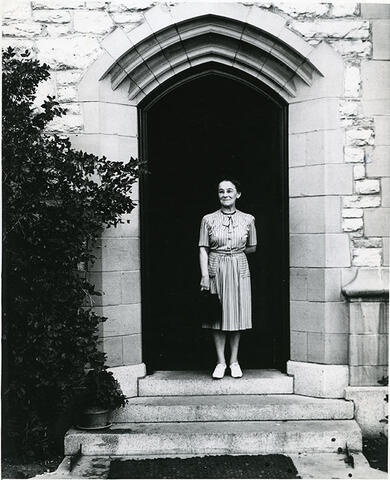
Title and statement of responsibility area
Title proper
Bertha G. Oxner
General material designation
- Graphic material
Parallel title
Other title information
Title statements of responsibility
Title notes
Level of description
Item
Reference code
Edition area
Edition statement
Edition statement of responsibility
Class of material specific details area
Statement of scale (cartographic)
Statement of projection (cartographic)
Statement of coordinates (cartographic)
Statement of scale (architectural)
Issuing jurisdiction and denomination (philatelic)
Dates of creation area
Date(s)
-
[between 1925 and 1949] (Creation)
Physical description area
Physical description
1 photograph : b&w ; 20.5 x 25.5 cm
Publisher's series area
Title proper of publisher's series
Parallel titles of publisher's series
Other title information of publisher's series
Statement of responsibility relating to publisher's series
Numbering within publisher's series
Note on publisher's series
Archival description area
Name of creator
Custodial history
Scope and content
Bertha Oxner, director of Women's Work and professor in the College of Agriculture, standing in a doorway of a campus building.
Bio/Historical Note: Bertha Georgina Oxner was small of stature but the organizational skills she brought to Saskatchewan loomed large in the difficult years of the 1930s and 1940s. Born in 1885 at Chester Basin, Nova Scotia, she obtained her schooling at Chester Basin, Chester, and Truro and taught school for a period before moving to Saskatchewan in 1908. Oxner taught school in Saskatoon, Brock and Saltcoats. At Brock she is remembered for having instituted hot school lunches which proved valuable for the children of homesteaders in the 1920s. She also set up a basketball league. After serving as principal at Saltcoats, Saskatchewan, Oxner left the school teaching profession to study household science at the University of Saskatchewan, obtaining a BA. At Chicago University she earned an MA and did post-graduate work in textiles and clothing. In 1925 Oxner came to the University of Saskatchewan as assistant professor in household science. With Ethel B. Rutter she helped plan the Bachelor of Household degree, which resulted in a School of Household Science at the university in 1928. In 1930 Oxner was appointed director of women’s extension work. In this role she introduced a broad educational program for rural women and members of Saskatchewan Homemakers' Clubs. Through Oxner’s guidance women were encouraged to expand their knowledge of agriculture, arts and letters, family law, public health and international affairs. Through a weekly column in The Western Producer she passed along program ideas and advice to the 350 Homemakers' Clubs. Oxner began short courses for rural girls in 1933 and helped launch Homecraft Clubs in 1938. In the first year, 124 Homecraft Clubs were organized. Oxner helped start Farm Women’s Week on the university campus. She organized the first Homemakers' Club on a First Nation and these spread across the province and initiated short courses for Métis women. Oxner served on the boards of the Canadian Association for Adult Education, the National Vocational Training advisory council, Canadian Association of Consumers, National Farm Radio Forum, Canadian Home Economics Association, Saskatchewan Physical Fitness Council, Saskatchewan Technical Education Committee and the Saskatchewan Farm Housing Committee. Oxner retired in 1949 and moved back to Chester, Nova Scotia. Oxner died in Chester on 7 December 1960 and is buried there.
Notes area
Physical condition
Immediate source of acquisition
Arrangement
Language of material
Script of material
Location of originals
Availability of other formats
Restrictions on access
Terms governing use, reproduction, and publication
Other terms: The researcher assumes responsibility regarding questions of copyright that may arise in the use of any images.

